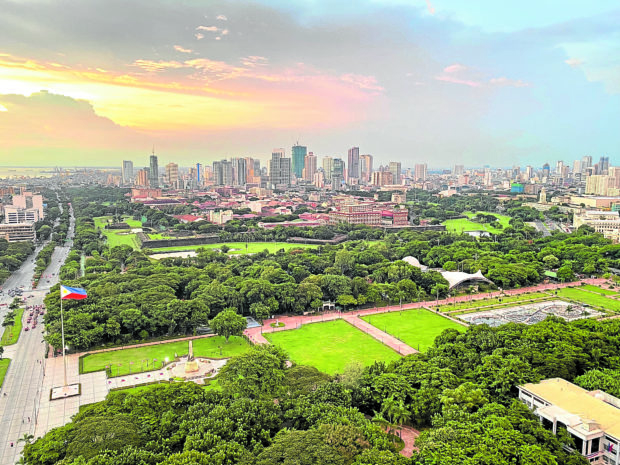Manila is the historical, geopolitical and cultural center of the Philippines. Our city is home to 1.8 million people and is the center of Metro Manila, which has 14 million people. Manila is the densest city in the world and forms the core of one of the largest megacities. This urban area generates 60 to 70 percent of our country’s gross domestic product (GDP) and is one of the strongest primate cities in any country.
The history of Manila stretches back to the Lakans of Tondo (the densest district in the world) and the Majapahit kingdom of Manila. The Spanish city of Manila was chartered in 1571. Manila is a city settled along the mouth of the Pasig River, bounded by Manila Bay to the west, Laguna Lake to the southeast, and the Sierra Madre to the east. This small strip of relatively flat land has given rise to one of the world’s biggest cities.
All roads lead to Manila
Metro Manila is a semicircle whose development is bounded by a series of circumferential roads. The development of the other cities in the metropolitan region, along with its relative density and population, radiates outward from the center of Manila.
The development of suburban enclaves into our various central business districts (CBDs) has created a polycentric city. In a way, this is a good development model for the city but much of our problem arises from the origins of these CBDs as suburban enclaves and their lack of accommodation for the working class. This has made many of the adjoining cities and provinces into bedroom communities and has led to the constant sprawl that has spread to over a hundred kilometers north and south of the city.
The City of Manila itself is similar in size and density to the borough of Manhattan. This population density however is not reflected in its built-up area. This has resulted in a gross lack of open space and public facilities.
The single greatest need for our city is housing. While infrastructure programs try to address our transportation problems, they will never be able to meet the needs of a sprawling mega city unless we build up the core and find more space for our people.
The walled city of Intramuros, the numerous churches and the plazas are such unique sights especially for Asian tourists
Our beautiful heritage
Manila is a beautiful city. It is walkable and filled with all sorts of unique places. Manila can be such a rich and powerful cultural attraction for tourists. The walled city of Intramuros, the numerous churches and the plazas are such unique sights especially for Asian tourists who form the majority of our visitors. Manila is home to so much of our Spanish and American heritage, as well as iconic buildings from our neocolonial and Art Deco period. Walking down Escolta or Rosario, one can squint and almost see the former glory of our beloved city.
As many of the world’s top tourist destinations will show, cultural tourism is the most attractive and strongest draw for frequent and repeat travelers. When was the last time you heard of Manila as a tourist destination? A well-coordinated tourist program could do so much for the City of Manila.
This program would include a comprehensive database of our built heritage along with strong branding and promotion of our unique and diverse districts. Cultural tourism would provide the main commercial impetus towards the preservation of our heritage and would provide much needed livelihood for Manileños.
Manila now
Manila today is undergoing much needed change and revitalization under the leadership of Mayor Isko Moreno Domagoso.
Current programs began with clearing up our streets and have grown towards renovating our landmarks and the construction of much needed medical facilities. The best part of this current program is the public housing that is being provided for our people. Public housing remains the biggest challenge for our city, and we need to continue this effort to rehouse and not relocate our citizens.
Manila is the heart of our country. We cannot survive as a country if we allow its heart to deteriorate and decay. We can only move forward as a people if our cities are healthy and vibrant. Our challenges today show how the neglect of our human environment has led to so much of our troubles and ills. The political strength of our leaders derives from the will of our people.
Let us find the will to build a better city for a better tomorrow.
